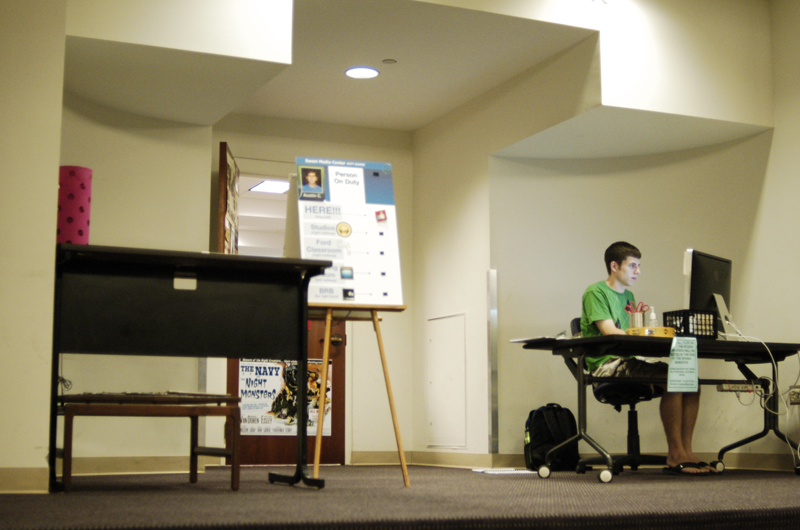While some students dance and celebrate during King and Queens Ball, others, like Jake Silver ’15, work behind the scenes with Campus Catering, preparing and serving food and drinks.
Silver, like many students across the nation, joined the workforce to offset rising college costs.
According to the National Survey of Student Engagement Rising, tuition costs and recession troubles are forcing more and more college students to find a balance between part-time employment and academic pursuits. While finding a job may be necessary in order to afford college, the study also found that working more than 21 hours a week directly interferes with studies.
At the College of William and Mary, the Financial Aid office is responsible for managing student employment. Assistant director at the office of Student Financial Aid Ginia Anderson explained that the office strives to help families afford education through financial aid packages and employment opportunities. While understanding students need for extra cash, she encourages students not to rush the employment process.
“One thing we’ve found is that freshmen have the most difficulty [finding employment], because upperclassmen have already sewn up many of the jobs,” Anderson said. “The first semester is critical for them to get acclimated. You can always [start] your second semester.”
Silver expressed appreciation for his job’s flexible hours and encouraged other students to carefully consider part time employment.
“I waited till the spring semester to get a job, to see if I would have the time for it,” Silver said. “I definitely think that it’s something that you have to think about. It’s another big thing that you’re going to be involved in, and they expect you to work.”
In compliance with school regulations, students with on-campus jobs may work a maximum of 20 hours per week during the school year. During breaks, the limit is set at 40 hours per week. Students employed at the College are less likely to experience the detrimental scholastic effects of working too many hours a week than students who work off campus without these limits.
Jocelyn Williams ’13 who works at the information desk in the Sadler Center, stressed that time management skills are critical to a successful balance between academics and employment.
“I don’t feel that the job interferes with my studies,” Williams said. “I can always get my work done behind the desk.”
Students can seek a variety of on-campus jobs at the Student Recreation Center, the Office of Student Activities, the Sadler Center, Dining Services, Earl Gregg Swem Library and the Athletics Departments. Funds Compliance specialist of Student Employment Cathy Jacobs explained the perks of on-campus work.
“I think most departments that hire undergraduates realize that students’ priorities are their schoolwork,” Jacobs said. “They’re not going to tell them, ‘You can’t have that time off to do your work.’”
The survey also found that one-third of the seniors and one-quarter of the freshmen interviewed declined to purchase all of their required academic materials due to the high costs of textbooks. Anderson advised students to shop for bargains and consider renting or buying used. She also urged students to thoroughly read their syllabi to determine which materials are specifically required in order to avoid incurring unnecessary expenses. Anderson attributed the high percentages in the survey to less than thorough financial aid programs.
“[The College’s] evaluation of the cost of attendance is all-inclusive,” Anderson said. “You have your room, your board, your tuition fees, your books and supplies, your personal expenses, and your travel costs. Other campuses may just take into account tuition fees, room and board. That may impact some of the students working, who are going to need those funds to take care of their books.”
The cost of textbooks prompted Nick M. Hoffman ’16 to work at the Rec Center as an intramural sports official. He encourages students to find work that they enjoy in order to find balance.
“I work nights mostly, so I will often get home at midnight with homework/reading to do,” Hoffman said. “Don’t feel like you have to take more hours than you can handle.”
It may be harder to regulate the number of hours that students can work off campus. Jacobs explained that the Financial Aid Office still attempts to present undergraduates with as many options as they can.
“We are contacted about a lot of jobs that are open off campus,” Jacobs said. “We refer [potential employees] to a website called WilliamsburgFamilies.com, which has a classifieds section for students and employers.”
Sophie Mason ’15 plans to study abroad this semester and is working as a hostess at the Fat Canary to fund her plans. She acknowledged the trade-off, citing long but flexible hours, and noted that, while the job requires a lot of energy, she enjoys the work. Mason hopes that the part-time employment will allow her to cover living expenses and spending money for her upcoming semester abroad.
“If you decide to get a job while in college — whether by choice or necessity — make sure that it is worth it to you,” Mason said. “The college experience is about more than the 4.0 GPA, and I think having a job can, in some situations, help a student more than, say, analyzing a poem by John Donne or reading about public policy in Tasmania. You’ll gain relevant life experience and learn more about yourself.”

